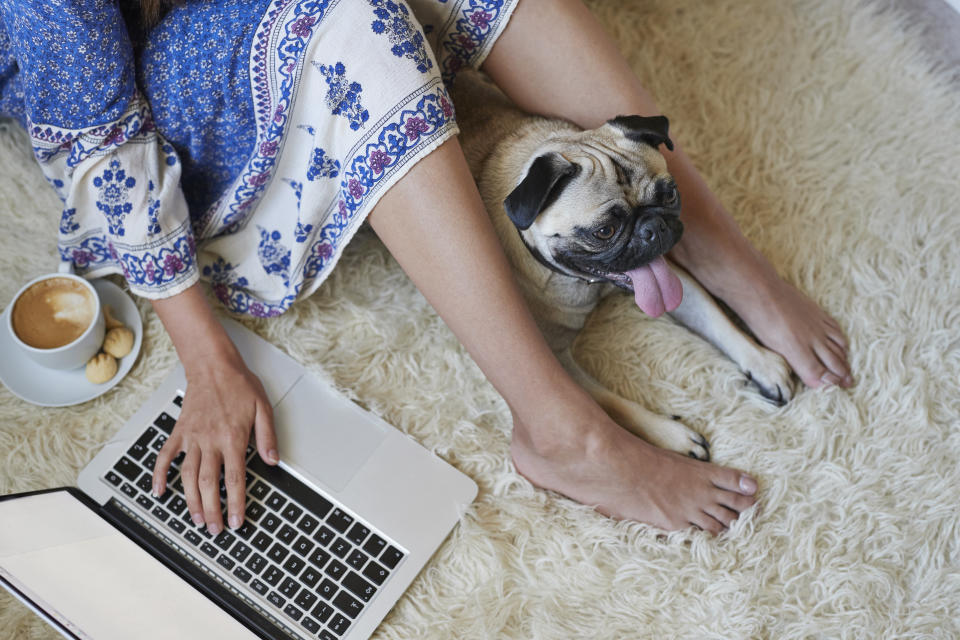How to be good to yourself when working from home

It’s a scenario many of us are familiar with, now the COVID-19 crisis means we are working from home. You’ve cobbled together a makeshift workspace and you’re ready to get started on your day, but you’re trying to keep your restless kids busy, distracted by a pet who won’t leave you alone and worried about your parents in quarantine.
Your phone pings every so often with WhatsApp notifications from friends in a similar situation.
As the hours pass, you feel unproductive and frustrated at the lack of work you’ve managed to get done. Soon, the frustration turns to stress as the pressure builds to try and keep calm and carry on - and you become more exhausted and frazzled.
Working from home can be difficult, particularly during a global pandemic. So how can you be better to yourself - and still get things done?
Read more: Why we need to get used to over-communication
“These are challenging times for everyone and we’re all feeling vulnerable at the moment. At a time like this, we need access to our inner resources and this means being compassionate to ourselves and everyone else,” says Dr Elena Touroni, a consultant psychologist and co-founder of My Online Therapy.
“While it would be great if we could all take this as an opportunity to become our most productive, healthiest selves, it’s unrealistic to think we’re not going to be impacted by a stressful situation,” she says. “Make sure you’re taking plenty of breaks and doing things that nourish you and provide you with a sense of wellbeing and enjoyment. But most of all, be kind to yourself.”
Plan your day
When you’re working in an office, it’s easy to fall into a routine - checking your emails first thing, meeting at 10am, lunch at 12.30pm and so on. But when your schedule is flexible, you need to be more diligent about structuring your day and setting boundaries for yourself to get things done.
There is no “right” way to work from home as everyone works best differently. Some people may be more productive first thing in the morning, while others may be night owls. So plan your day in a way that works for you, scheduling in plenty of breaks and setting yourself a reasonable amount of work to get done.
Read more: Would working fewer hours tackle the climate crisis?
It’s also important to be realistic though. The Covid-19 crisis is taking its toll on everyone and it’s OK to get less done than usual - your employer should be aware and understanding of this too. There are times when your home-working schedule will need to change too, for example, if there is an emergency at work or if your child becomes unwell.
Don’t multitask
Although we might pride ourselves in being able to do several things at once, our brains aren’t actually designed to multitask. As multiple studies have shown, we actually get far more done by doing less and focusing on one thing at a time.
And according to Stanford University researchers, people who are regularly bombarded with several streams of electronic information do not pay attention, control their memory or switch from one job to another as well as those who prefer to complete one task at a time.
Multitasking has also been found to increase the production of the stress hormone cortisol as well as the fight-or-flight hormone adrenaline, which can overstimulate your brain and make it difficult to think clearly.
Designate an “off” time
It’s tempting to work late into the night even if you started in the morning, particularly if you feel you haven’t got enough done. But it’s important to turn your laptop off, stop checking your emails and switch off from work completely to avoid burnout - a state of chronic stress.
Set yourself a time to stop working and try to stick to it, if you can. And take regular breaks too, even if it’s just a 10-minute walk around the garden or a quick coffee on the balcony.
Looking after yourself can come quite far down on your list of priorities, but it’s important when things are stressful. “Create your own self-soothing kit with activities or treats which support your wellbeing e.g. a nice long bath, lighting a few candles, watching something funny,” Touroni says.
Don’t be too hard on yourself
If you are able to leave your house for a walk or jog, it might clear your head and give you a brief escape when it feels like the walls are closing in on you. If you’re not feeling up to exercising, though, that’s fine too.
“While regular exercise and nutritious meals are important for our physical and mental wellbeing at the moment, try not to be hard on yourself,” Touroni says. “Make sure you’re balancing it with treats and plenty of rest.”


